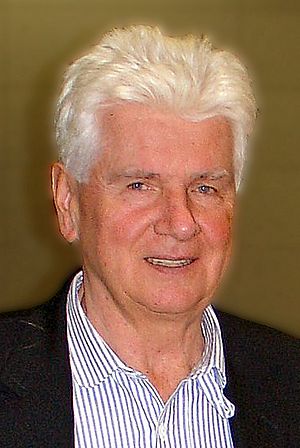Günter Blobel facts for kids
Quick facts for kids
Günter Blobel
|
|
|---|---|

Günter Blobel at a science meeting in 2008
|
|
| Born | 21 May 1936 Waltersdorf (now Niegosławice), Lower Silesia, Germany
|
| Died | 18 February 2018 (aged 81) New York City, New York, US
|
| Citizenship | German and American |
| Alma mater | University of Kiel University of Tübingen (M.D.) University of Wisconsin–Madison (Ph.D.) |
| Known for | Gene gating hypothesis Protein targeting Signal recognition particle |
| Awards | NAS Award in Molecular Biology (1978) Canada Gairdner International Award (1982) Otto Warburg Medal (1983) Richard Lounsbery Award (1983) E.B. Wilson Medal (1986) Keith R. Porter Lecture (1986) Louisa Gross Horwitz Prize (1987) Max Delbrück Medal (1992) Albert Lasker Award for Basic Medical Research (1993) Ciba-Drew Award (1995) King Faisal Prize (1996) Mayor's Award (1997) Nobel Prize in Physiology or Medicine (1999) Massry Prize (1999) Mendel Lecture (2012) |
| Scientific career | |
| Fields | Biology |
| Institutions | Rockefeller University |
| Academic advisors | George Palade |
| Doctoral students | Peter Walter |
| Other notable students | David J. Anderson |
Günter Blobel (born May 21, 1936 – died February 18, 2018) was a German-American biologist. He won the Nobel Prize in Physiology or Medicine in 1999. His big discovery was that proteins have special "address tags" that tell them where to go inside a cell. Think of it like a mailing address for tiny cell parts! This helped us understand how cells work.
Contents
Life and Education
Günter Blobel was born in Waltersdorf, a place that was part of Germany back then. In 1945, when he was eight, his family had to leave their home to escape the war. They moved to a farm near Dresden. During the heavy bombing of Dresden, Günter and his family were safe at the farm.
After the war, Günter grew up in Freiberg, Germany. He studied medicine at the University of Tübingen and finished in 1960. Later, he moved to the United States and earned his Ph.D. from the University of Wisconsin–Madison in 1967. He then joined Rockefeller University in New York City, where he became a professor.
Amazing Discoveries in Cell Biology
Günter Blobel's most important work was about how cells organize themselves. Imagine a cell as a busy city with many different buildings (called organelles) and workers (called proteins). Each protein needs to go to the right building to do its job.
How Proteins Find Their Way
Before Blobel's work, scientists didn't fully understand how proteins knew where to go. Blobel discovered that proteins have special "signal peptides." These are like tiny built-in address labels. When a new protein is made, this signal peptide guides it to the correct place inside the cell. This process is called protein targeting.
His discovery was a huge step forward in cell biology. It helped scientists understand many diseases and how cells function. For this groundbreaking work, he was awarded the Nobel Prize in 1999.
Helping Others and Rebuilding History
Günter Blobel was also known for his kindness and for helping to rebuild historical places in Germany.
Giving Back to Dresden
He loved the city of Dresden, where his family had found safety during the war. In 1994, he started a group called "Friends of Dresden, Inc." He gave all of his Nobel Prize money to help restore Dresden. A big part of this money went to rebuilding the famous Dresden Frauenkirche, a beautiful church that had been destroyed in the war. He also helped build a new synagogue in the city.
He believed it was important to restore historical buildings. He also supported rebuilding the Paulinerkirche in Leipzig, a university church that had been torn down. He saw these places as important parts of German culture and history.
Personal Life
Günter Blobel lived in New York City and worked at Rockefeller University for many years. He was married to Laura Maioglio. Besides his passion for science, he also loved opera and architecture. He passed away in 2018 at the age of 81.
Awards and Honors
Günter Blobel received many important awards for his scientific work, including:
- 1978: NAS Award in Molecular Biology
- 1982: Gairdner Foundation International Award
- 1983: Otto Warburg Medal
- 1987: Louisa Gross Horwitz Prize
- 1993: Albert Lasker Award for Basic Medical Research
- 1999: Nobel Prize in Physiology or Medicine
He was also a member of several important scientific groups, like the United States National Academy of Sciences.
See also
- Distinguished German-American of the Year
- In Spanish: Günter Blobel para niños
 | Dorothy Vaughan |
 | Charles Henry Turner |
 | Hildrus Poindexter |
 | Henry Cecil McBay |

